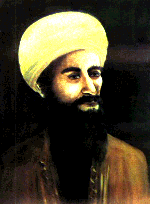Chemistry by Muslims
Chemistry as a science is unquestionably the invention of the Muslims. It is one of the sciences in which Muslims have made the greatest contribution and developed it to such a high degree of perfection that they were considered authorities in this science until the end of the 17th century A. D.
Jabir and Zakariya Razi have the distinction of being the greatest chemists the mediaeval times produced. Writing in his illuminating History of the Arabs, Philip K. Hitti acknowledges the greatness of Arabs in this branch of science when he says, "After materia medica, astronomy and mathematics, the Arabs made their greatest scientific contribution in chemistry. In the study of chemistry and other physical sciences, the Arabs introduced the objective experiment, a decided improvement over the hazy speculation of Greeks. Accurate in the observation of phenomena and diligent in the accumulation of facts, the Arabs nevertheless found it difficult to project proper hypotheses."
Jabir Ibn Hayyan (Geber)
 Jabir Ibn Hayyan (Geber) who flourished in Kufa about 776 A.D. is known as the father of modern chemistry and along with Zakariya Razi, stands as the greatest name in the annals of chemical science during mediaeval times. He got his education from Umayyad Prince Khalid Ibn Yazid Ibn Muawiyah and the celebrated Imam Jafar al-Sadiq. Jabir Ibn Hayyan (Geber) who flourished in Kufa about 776 A.D. is known as the father of modern chemistry and along with Zakariya Razi, stands as the greatest name in the annals of chemical science during mediaeval times. He got his education from Umayyad Prince Khalid Ibn Yazid Ibn Muawiyah and the celebrated Imam Jafar al-Sadiq.
He worked on the assumption that metals like lead, tin and iron could be transformed into gold by mixing certain chemical substances. It is said that he manufactured a large quantity of gold with the help of that mysterious substance and two centuries later, when a street was rebuilt in Kufa a large piece of gold was unearthed from his laboratory.
He laid great emphasis on the importance of experimentation in his research and hence he made great headway in chemical science, Western writers credit him with the discovery of several chemical compounds, which are not mentioned in his twenty-two extant Arabic works.
According to Max Meyerhof "His influence may be traced throughout the whole historic course of European alchemy and chemistry." He is credited, with the writing of 100 chemical works. "Nevertheless, the works to which his name was attached" says Hitti, "were after the 14th century, the most influential chemical treatises in both Europe and Asia."
He explained scientifically the two principal operations of chemistry, calcination and reduction, and registered a marked improvement in the methods of evaporation, sublimation filtration, distillation and crystallization. Jabir modified and corrected the Aristotelian theory of the constituents of metal, which remained unchanged until the beginning of modern chemistry in the 18th century.
He has explained in his works the preparation of many chemical substances including "Cinnabar" (sulphide of mercury) and arsenic oxide. It has been established through historical research that he knew how to obtain nearly pure vitrilos, alums, alkalis and how to produce 'the so-called liver' and milk of sulphur by heating sulphur with alkali.
He prepared mercury oxide and was fully conversant with the preparation of crude sulphuric and nitric acids. He knew the method of the solution of gold and silver with this acid. His chemical treatises on such subjects have been translated into several European languages including Latin and several technical scientific terms invented by Jabir have been adopted in modern chemistry.
A real estimate of his achievements is only possible when his enormous chemical work including the Book of Seventy are published. Richard Russell (1678, A.D.) an English translator ascribes a book entitled Sun of Perfection to Jabir. A number of his chemical works have been published by Berthelot. His books translated into English are the Book of Kingdom, Book of Balances and Book of Eastern mercury.
Jabir also advanced a theory on the geologic formation of metals and dealt with many useful practical applications of chemistry such as refinement of metals, preparation of steel and dyeing of cloth and leather, varnishing of waterproof cloth and use of manganese dioxide to color glass.
Jabir was recognized as the master by the later chemists including Al-Tughrai and Abu al-Qasim al-Iraqi who flourished in the 12th and 13th centuries respectively. These Muslim chemists made little improvement on the methods of Jabir. They confined themselves to the quest of the legendary elixir which they could never find.
Zakariya Razi
Zakariya Razi known as Rhazas in Latin is the second great name in mediaeval chemical science. Born in 850 A.D. at Rayy, he is known as one of the greatest physicians of all times. He wrote Kitab al Asrar in chemistry dealing with the preparation of chemical substances and their application. His great work of the art of alchemy was recently found in the library of an Indian prince.
Razi has proved himself to be a greater expert than all his predecessors, including Jabir, in the exact classification of substances. His description of chemical experiments as well as their apparatus are distinguished for their clarity which were not visible in the writings of his predecessors. Jabir and other Arabian chemists divided mineral substances into bodies (gold, silver etc.), souls (sulphur, arsenic, etc.) and spirits (mercury and sal-ammoniac) while Razi classified his mineral substances as vegetable, animal and mineral.
Other Notable Chemists
The mineral substances were also classified by Al-Jabiz. Abu Mansur Muwaffaq has contributed to the method of the preparation and properties of mineral substances. Abul Qasim who was a renowned chemist prepared drugs by sublimation and distillation. High class sugar and glass were manufactured in Islamic countries. The Arabs were also expert in the manufacture of ink, lacquers, solders, cements and imitation pearls.
Article Contributed by: itsIslam Staff |



